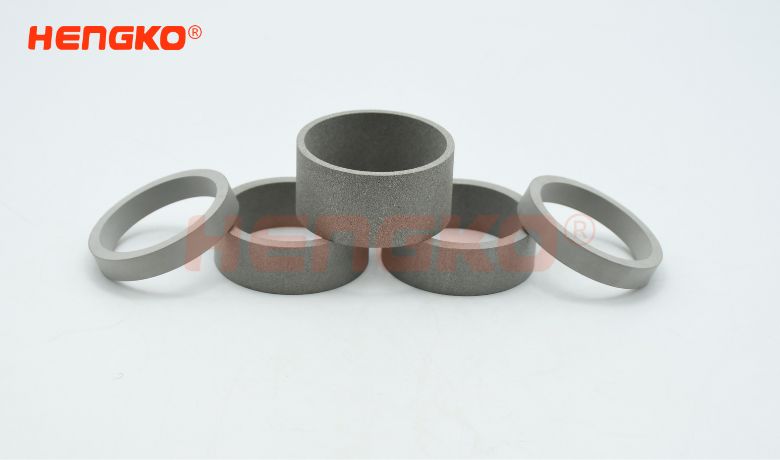-
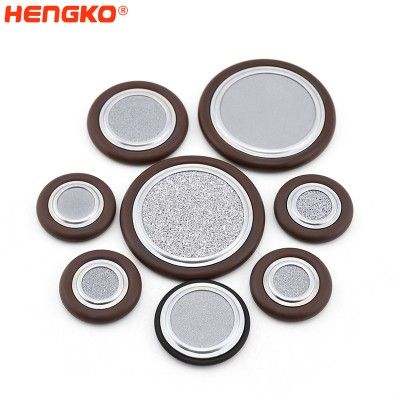
NW16 KF16 Flange-Centering O-Ring with Fine Filter
ISO-KF and NW Sintered Metal Filter Centering Ring NW-16、NW-25、NW-40、NW-50 Supplier With fine filter (sintered porous metal filter or choose wire mesh f...
View Detail -
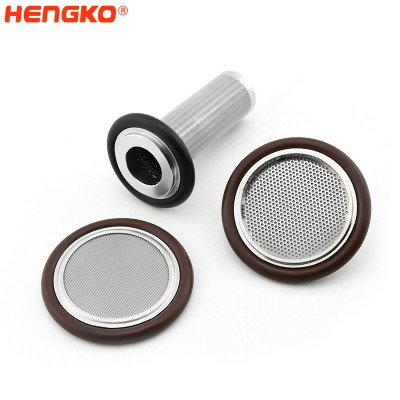
NW25 and KF25 Flange-Centering O-Ring with Fine Filter
ISO-KF and NW Sintered Metal Filter Centering Ring NW-16、NW-25、NW-40、NW-50 Supplier With fine filter (sintered porous metal filter or choose wire mesh f...
View Detail -
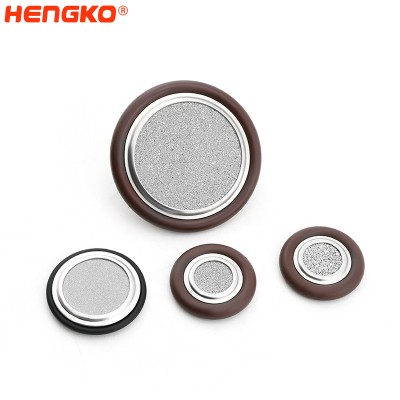
NW50 KF50 Vacuum Flange Centering ring with Sintered Metal Filter, stainless steel, 50 ...
NW50 KF50 Centering ring with Sintered Metal Filter, stainless steel, 50 ISO-KF Product material: stainless steel 304,316 Installation method: use with clam...
View Detail -

KF25 and NW25 Centering Ring with Sintered Metal Filter
NW25 / KF25KF Centering Ring with Sintered Metal Filter • NW25 (KF25, QF25) Series• Viton (Fluorocarbon, FKM) O-Ring• Viton: 200°C Maximum• 0.2 µm Pore Siz...
View Detail -
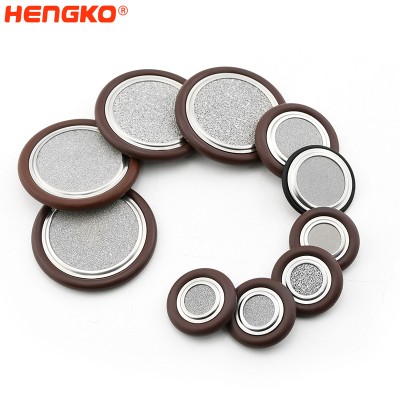
NW16 KF16 KF Centering Ring to Sintered Metal Filter
NW16 / KF16 KF Centering Ring to Sintered Metal Filter • NW16 (KF16, QF16) Series• Viton (Fluorocarbon, FKM) O-Ring• Viton: 200°C Maximum• 0.2 µm Pore Size•...
View Detail -
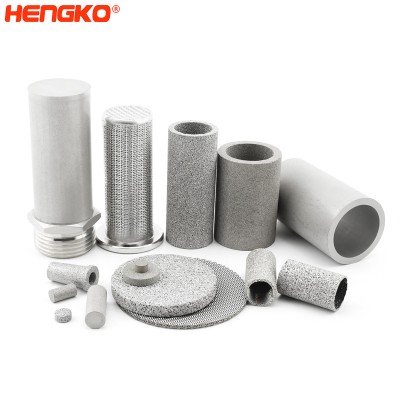
Cylindrical 25 50 micron stainless steel microns porous powder sintered filter tube for...
HENGKO stainless steel filter tubes are made by sintering 316L powder material or multilayer stainless steel wire mesh at high temperatures. They have been w...
View Detail -
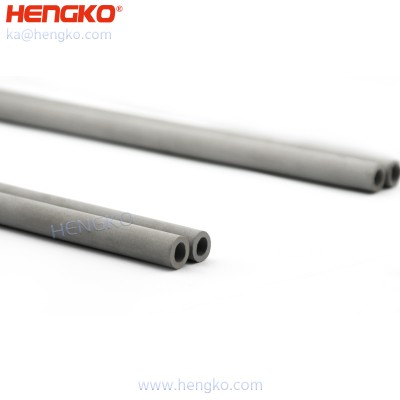
Professional Manufacturer Customized nano capillary nitrogen tube for lead-life reflow ...
HENGKO stainless steel filter tubes are made by sintering 316L powder material or multilayer stainless steel wire mesh at high temperatures. They have been w...
View Detail -
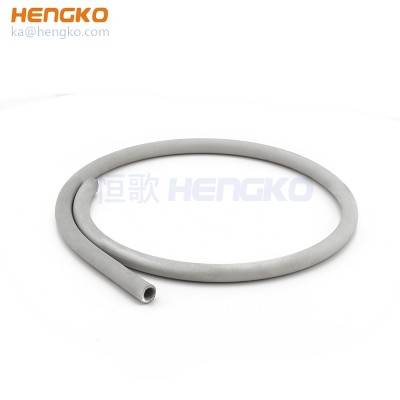
Customized size 316 stainless steel filter medical micro capillary tube for wave solder...
HENGKO stainless steel filter tubes are made by sintering 316L powder material or multilayer stainless steel wire mesh at high temperatures. They have been w...
View Detail -

Sintered 0.5 7 10 15 30 60 micron porous metal stainless steel filter capillary tube fo...
HENGKO stainless steel filter tubes are made by sintering 316L powder material or multilayer stainless steel wire mesh at high temperatures. They have been w...
View Detail -
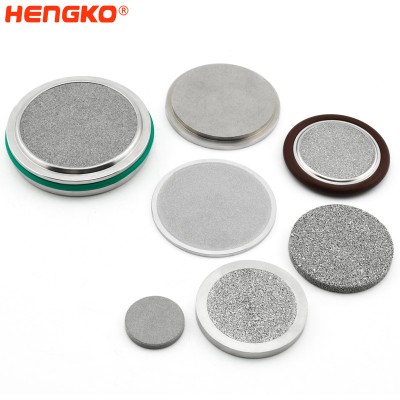
Sintered Stainless Steel Sanitary Tri Clamp Filter Disc with Viton O-Ring frit Gasket f...
At HENGKO® we try to help our customers build high-quality, safe, and precise operations for processing hemp. The best CBD extracts equipment that we’re rec...
View Detail -
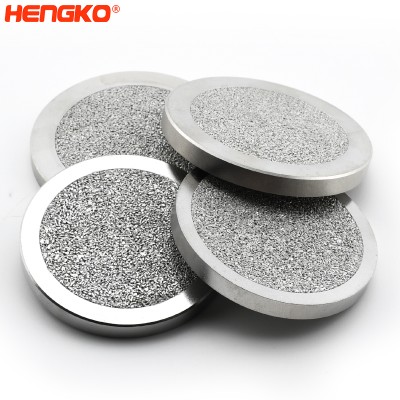
stainless steel filter disc supplier replacement microns sintered porosity metal powder...
Sintered Porous Metal Discs. similar to a metallic sponge. Porous Sintered Metal Filters consist of highly uniform, interconnected networks of pores with tor...
View Detail -

vacuum KF certering ring with Sintered Metal Filter
Product Describe The Flange Connections Centering rings with Sintered Metal Filter in vacuum technology are used up to the high vacuum range of 10 to -7 mbar...
View Detail -
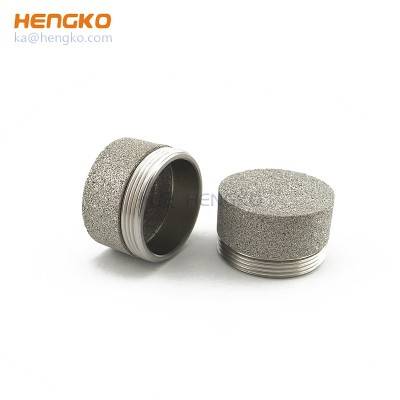
Special process sintering microns stainless steel porous metal cups filter elements
HENGKO manufactures filter elements in a broad range of materials, sizes, and fittings so they can be easily specified with the characteristics and configura...
View Detail -
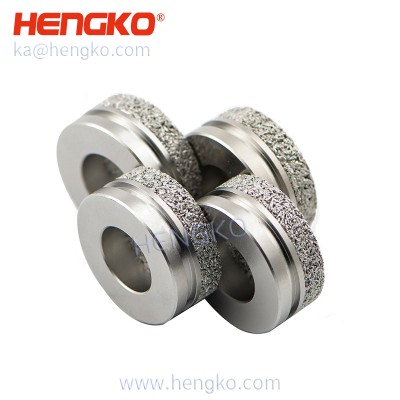
Customized size seamless sintered porous metal stainless steel 304/316L powder sinterin...
Introducing HENGKO's Sintered Filter Disc for Helium Leak Detectors: Unparalleled Performance and Efficiency! Product Features:- High Filtration Effi...
View Detail -
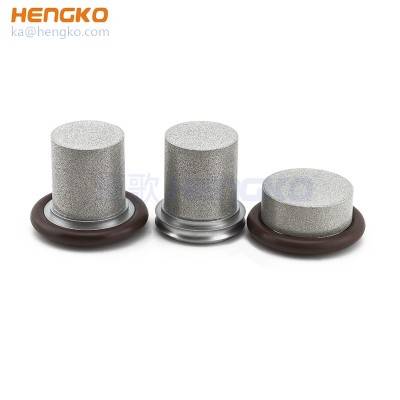
sintered metal stainless steel filters with centering ring used to build foreline vacuu...
Code Flange HKF10 NW10KF HKF16 NW16KF HKF20 NW20KF HKF25 NW25KF HKF40 NW40KF HKF50 NW50KF HENGKO centering ring assemblies with sintered ...
View Detail -
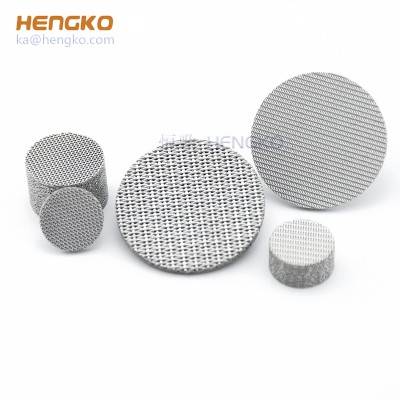
Stainless steel sintering wire mesh screen filter element for coffee filter or air cond...
HENGKO manufactures filter elements in a broad range of materials, sizes, and fittings so they can be easily specified with the characteristics and configura...
View Detail -
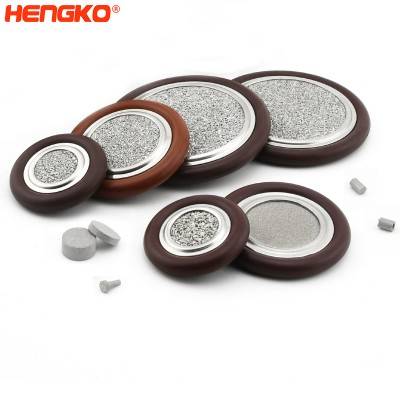
New vacuum centering ring iso screen, sintered porous metal filter
Centering rings with Sintered Metal Filter are the standard components for all vacuum and high vacuum applications. Centering rings with sintered metal filte...
View Detail -
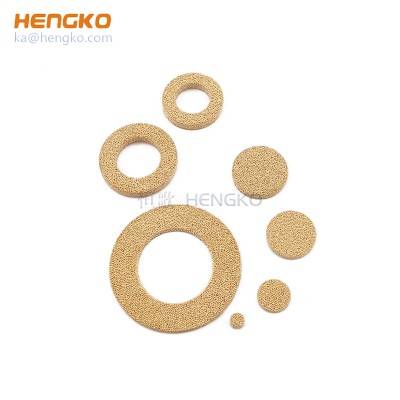
Micron metal porous sintered powder metal bronze ring filters
Product Describe HENGKO porous filter tubes can be hollow or blind and have a minimum wall thickness of 1 mm. They are made by isostatic compaction of powder...
View Detail -
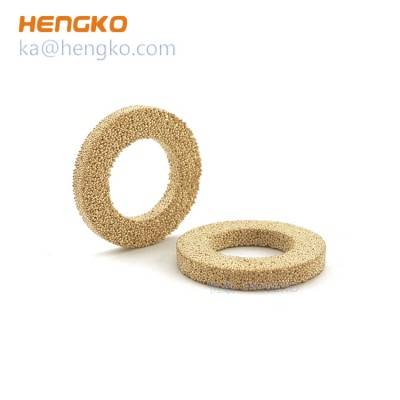
3-90 Micron sintered metal brass bronze powder ring filter for industrial and chemical ...
HENGKO manufactures filter elements in a broad range of materials, sizes, and fittings so they can be easily specified with the characteristics and configura...
View Detail
Where Ring Style Porous Sintered Metal Filters Used to ?
Porous sintered metal rings are used in a variety of applications, including:
* Filtration:
Porous sintered metal rings can be used to filter liquids and gases, removing particles of various sizes.
They are commonly used in food and beverage processing, pharmaceutical manufacturing, and chemical processing.
* Fluid control:
Porous sintered metal rings can be used to control the flow of fluids, such as air, water, and oil.
They are commonly used in pneumatic and hydraulic systems, as well as in fuel and lubrication systems.
* Heat exchange:
Porous sintered metal rings can be used to transfer heat between fluids.
They are commonly used in heat exchangers, such as those used in air conditioning and refrigeration systems.
* Gas diffusion:
Porous sintered metal rings can be used to diffuse gases, such as oxygen and hydrogen.
They are commonly used in fuel cells and other gas-powered devices.
* Acoustic damping:
Porous sintered metal rings can be used to dampen sound waves.
They are commonly used in mufflers and other noise control applications.
These are just a few of the many applications for porous sintered metal rings.
They are a versatile and durable material that can be used in a wide variety of industries.
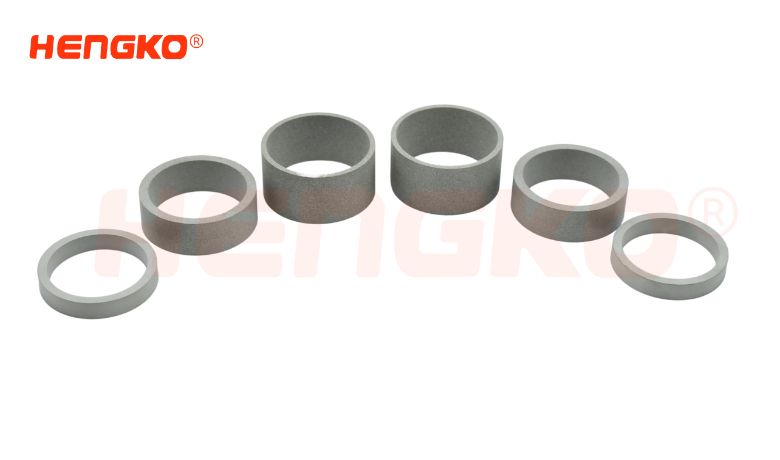
Why design the metal filter to be Ring ?
There are several reasons why metal filters are often designed to be rings.
* Surface area:
Rings have a large surface area relative to their volume, which makes them ideal for filtration applications.
The more surface area the filter has, the more particles it can trap.
* Strength:
Rings are very strong and can withstand high pressures and temperatures.
This makes them ideal for use in demanding applications, such as industrial filtration and fluid control.
* Durability:
Rings are very durable and can withstand repeated use and cleaning.
This makes them a cost-effective choice for many applications.
* Ease of manufacturing:
Rings are relatively easy to manufacture, which helps to keep their cost low.
Here are some specific examples of how ring-shaped metal filters are
used in different applications:
1. Food and beverage processing:
Ring-shaped metal filters are used to filter liquids and gases in food and beverage processing plants.
For example, they are used to filter water before it is used in beverage production, and to filter air before it is used in packaging facilities.
2. Pharmaceutical manufacturing:
Ring-shaped metal filters are used to filter liquids and gases in pharmaceutical manufacturing facilities.
For example, they are used to filter sterile water and air, and to filter drug products before they are packaged.
3. Chemical processing:
Ring-shaped metal filters are used to filter liquids and gases in chemical processing plants.
For example, they are used to filter acids, bases, and other corrosive chemicals.
4. Pneumatic and hydraulic systems:
Ring-shaped metal filters are used to filter compressed air and hydraulic fluid.
This helps to protect the components in these systems from wear and tear.
5. Heat exchangers:
Ring-shaped metal filters are used to increase the surface area between the hot and cold fluids in heat exchangers.
This improves the efficiency of the heat transfer process.
FAQ :
1. What is a sintered metal ring filter?
A sintered metal ring filter is a type of filter that is made from metal powder that has been sintered, or pressed together at a high temperature.
This process creates a porous metal filter that can be used to remove particles from fluids and gases.
2. What are the advantages of sintered metal ring filters?
Sintered metal ring filters offer a number of advantages over other types of filters, including:
* High filtration efficiency: Sintered metal ring filters can remove particles of various sizes, down to sub-micron levels.
* Chemical compatibility: Sintered metal ring filters are compatible with a wide range of chemicals and solvents.
* High temperature and pressure resistance: Sintered metal ring filters can withstand high temperatures and pressures,
making them ideal for use in demanding applications.
* Long service life: Sintered metal ring filters are very durable and have a long service life.
* Easy to clean and maintain: Sintered metal ring filters are easy to clean and maintain, and can be used repeatedly.
3. What are the different types of sintered metal ring filters?
Sintered metal ring filters can be made from a variety of different metals, including stainless steel, bronze, and titanium.
They can also be made with different pore sizes to meet the specific needs of different applications.
4. What are the typical applications for sintered metal ring filters?
Sintered metal ring filters are used in a wide range of industries, including:
Food and beverage processing
Pharmaceutical manufacturing
Chemical processing
Electronics manufacturing
Automotive industry
Aerospace industry
Oil and gas industry
Water and wastewater treatment
5. How are sintered metal ring filters cleaned?
* Sintered metal ring filters can be cleaned using a variety of methods, including:
* Backwashing: Backwashing involves flushing the filter in the opposite direction of the normal flow of fluid.
This helps to remove any trapped particles.
* Chemical cleaning: Chemical cleaning involves soaking the filter in a chemical solution to remove any contaminants.
* Ultrasonic cleaning: Ultrasonic cleaning uses high-frequency sound waves to remove particles from the filter.
6. How often should sintered metal ring filters be cleaned?
The frequency of cleaning for sintered metal ring filters depends on the specific application.
However, it is generally recommended to clean the filters regularly to maintain optimal performance.
7. What are the signs that a sintered metal ring filter needs to be replaced?
Some of the signs that a sintered metal ring filter needs to be replaced include:
* Reduced flow rate: If the flow rate through the filter is reduced, it may indicate that the filter is clogged and needs to be cleaned or replaced.
* Increased pressure drop: An increased pressure drop across the filter may also indicate that the filter is clogged and needs to be cleaned or replaced.
* Visible damage: If the filter is damaged, such as if it is cracked or dented, it should be replaced immediately.
8. How to choose the right sintered metal ring filter for your application?
When choosing a sintered metal ring filter, it is important to consider the following factors:
* The type of fluid or gas to be filtered: The filter material should be compatible with the fluid or gas being filtered.
* The particle size to be removed: The pore size of the filter should be smaller than the particle size to be removed.
* The flow rate and pressure drop requirements: The filter should be able to handle the required flow rate and pressure drop.
* The operating temperature and pressure: The filter should be able to withstand the operating temperature and pressure of the application.
9. How to install a sintered metal ring filter?
Sintered metal ring filters can be installed in a variety of ways, depending on the specific application. However, some general installation guidelines include:
* The filter should be installed in the line before the fluid or gas reaches the equipment to be protected.
* The filter should be installed in a location where it is easily accessible for cleaning and maintenance.
* The filter should be installed in a manner that minimizes the amount of dead space around the filter.
* The filter should be properly secured to prevent it from leaking.
Contact HENGKO today to learn more about our sintered metal ring filters and how we can help you meet your specific needs.
